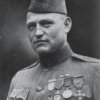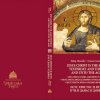Please join the Harriman Institute and the East Central European Center for the Njegos Endowment for Serbian Language and Culture lecture series with:
Marija Sajkas, Author
“Esther Jovnovic’s Scrapbook”
The novel is a fictional account of two immigrations, from Belgrade to New York in the 1930s and from New York to Belgrade in the 1990s.
The author will be introduced by Radmila Gorup.
Columbia University
Friday, February 21, 2014
Room 1219 IAB, 7:15 pm
420 West 118th Street
12th Floor
New York, NY 10027
.




